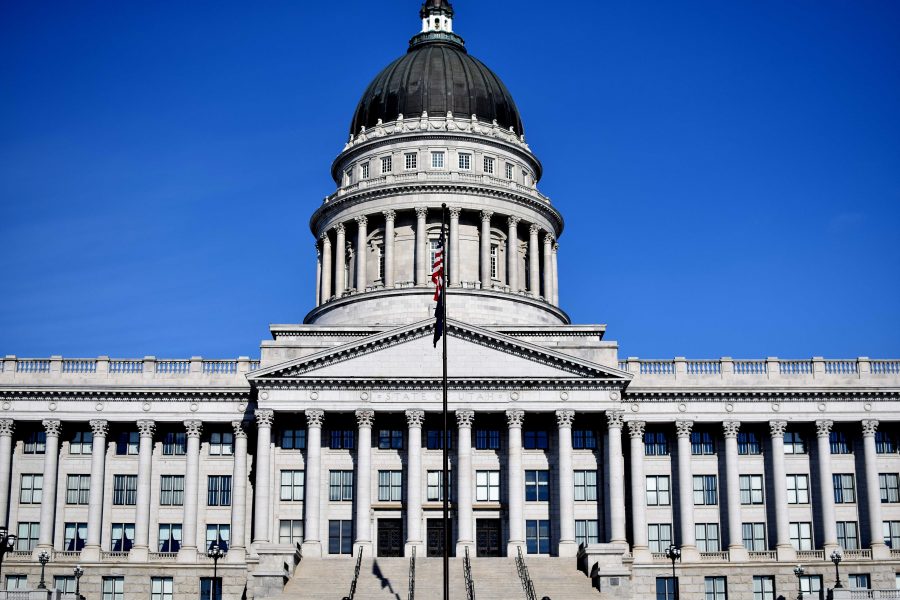Cowley: Pass Meaningful Marijuana Legislation
Utah State Capitol. Chronicle archives.
March 4, 2023
The Utah State Legislature made medical marijuana legal in Dec. 2018. Every year since then, the legislature has done nothing but tweak the already existing laws each session.
As of Nov. 2022, recreational marijuana is legal in 21 states, with more getting closer to legalization every year. But the reluctance of our legislature to move forward with marijuana reform illustrates a larger problem within Utah’s government: the lack of willingness to make changes that benefit citizens in Utah.
Utah’s legislature needs to stop treading old ground and begin to take steps forward with marijuana reform.
Current Legislation
The two marijuana-related bills introduced during the 2023 General Session were S.B. 91 and H.B. 27. S.B. 91 seeks to reword what is and isn’t legal in the state’s currently existing laws, while H.B. 27 lessens the likelihood of a felony charge for a former offender with a medical marijuana card.
Putting aside the fact that people legally possessing marijuana should not face repercussions for owning it, neither of these bills put forth any significant changes to pre-existing laws. Since medical marijuana’s legalization, Utah has stagnated heavily in marijuana reform. The closest thing to change has been the approval of drive-through dispensaries and home delivery. These changes still neglect to address the fact that in the state of Utah, one can still be arrested and incarcerated for possession.
Recent polling shows that 58% of Utahns are for the legalization of marijuana. So, why are our representatives still stalling?
Roadblocks
It is no secret that The Church of Jesus Christ of Latter-Day Saints is not a fan of cannabis. Use of cannabis of any kind had been banned by the church until recently. Still, the use of marijuana is frowned upon unless being used for chronic pain.
According to Utah Business, when the legalization of medical marijuana was passed in 2018 by a vote of 52.75%, a special legislative meeting was held one day before the new law was to be signed. Legislators rewrote a large portion of the proposition, and the sudden and complete overhaul of Proposition 2 was completed “at the behest” of the LDS church.
This egregious overstep of the church illustrates the continued power the church has on Utah politics, explaining some roadblocks that Utah has experienced when trying to pass marijuana reform.
It is a legislator’s job to not only draw a clear line between church and state, but to also represent the people they are creating laws for. On both accounts, our current government is failing us.
Marijuana Reform
Cannabis in Utah is a rapidly growing industry. An estimated 3,000 people every month are applying for and receiving cannabis cards. However, you are still at risk of ending up incarcerated for possession.
Utah remains one of the 19 states that criminalize the possession of marijuana. Under current Utah law, a person convicted of possession can spend six months in jail — but these laws do not affect all Utahns equally. Even though smoking rates are pretty much the same across the board, Black people are 4.9 times more likely than white people to be arrested for cannabis-related charges.
Utah’s criminalization of cannabis only serves to put more people in prison. Marijuana is also one of the most common drugs to be arrested for, with it making up 49% of all drug-related arrests in Utah.
On top of that, drug charges don’t magically disappear when a person leaves jail. A criminal record, no matter what the charge, can prevent someone from being approved for housing, jobs and higher education. The continuous criminalization of marijuana serves as nothing more than a way to target and incarcerate BIPOC. No amount of criminalization is going to stop people from smoking cannabis — it will only make it riskier to do so.
The Utah State Legislature’s complacency towards marijuana reform keeps in place structures used to target BIPOC. Their resolve to ignore the voices of the majority of Utahns to serve a select few is disappointing, but not surprising. The criminalization of marijuana is outdated and needs to be put to bed.
For the best interest of Utahns, there needs to be a push for the complete decriminalization and legalization of marijuana. We should be past the point of putting people away for nonviolent drug charges that will do nothing but make life harder for those affected.









Curtis • Mar 27, 2024 at 7:20 pm
I live in Washington State we’re recreational and medical marijuana has been legal sine 2012.
In 2022, retailers did $1.3 Billion dollars in sales and its just growing and growing.
Granted, that’s peanuts in comparison to stalwart in-state business like Microsoft ($227.58B), Costco ($248.83B), Amazon ($513.83B), Starbucks ($36.68B), Safeco Ins ($6.3B), Alaska Airlines ($10.4B) and The University of Washington ($5.9B) but in a few more years it will most likely catch up to a few of these.
It’s a HUGE industry. And believe it or not, it affects the tourism industries here too. People LOVE the idea of vacationing in a place where they can vacation as they want.
I’m 69 and went into the USAF in the early 1970’s so I NEVER smoked pot when it was illegal. But I grew up in the 60’s and early 70’s and we smoked pot then. So when it became legal, I was overjoyed!
🙂
Lorry • Mar 5, 2023 at 5:11 pm
Don’t forget to check out Evan Vickers home page. He’s a Utah state legislator who is firmly against cannabis law changes, perhaps because he owns more than one pharmacy (last time I checked !) selling Prozac, Percocet, etc to the masses in Iron county
Sean • Mar 5, 2023 at 7:57 am
Utah is giving away millions of dollars a year to Nevada just make it legal
Moxey • Mar 4, 2023 at 4:34 pm
Maybe they should drive to Wendover and count the license plates!!
UTAH IS GIVING AWAY MONEY TO
NEVADA!!!
Lorry • Mar 4, 2023 at 8:22 pm
I live in Uintah county, take a drive over to Dinosaur Colorado, check plates at the dispensaries and the liquor store, not to mention Lotto ticket sales!
Sean • Mar 5, 2023 at 7:55 am
I was there before I got my card and there all utah plates everyone of them except the people That work in the dispensa